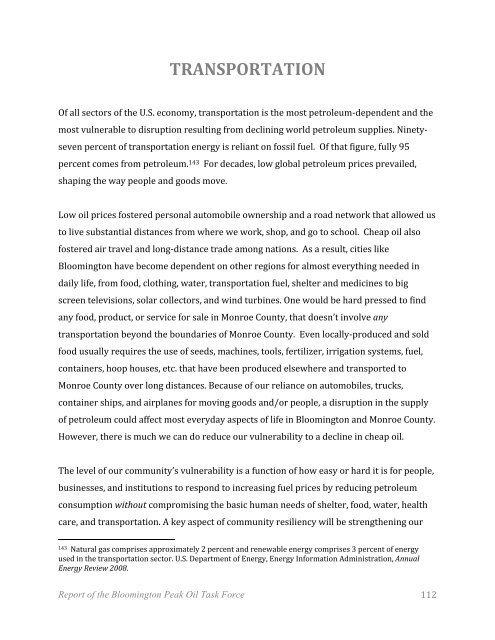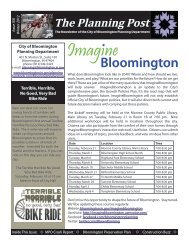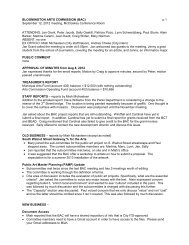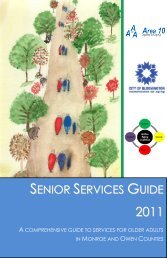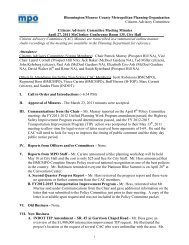Peak Oil Task Force Report - City of Bloomington - State of Indiana
Peak Oil Task Force Report - City of Bloomington - State of Indiana
Peak Oil Task Force Report - City of Bloomington - State of Indiana
Create successful ePaper yourself
Turn your PDF publications into a flip-book with our unique Google optimized e-Paper software.
<strong>Report</strong> <strong>of</strong> the <strong>Bloomington</strong> <strong>Peak</strong> <strong>Oil</strong> <strong>Task</strong> <strong>Force</strong><br />
TRANSPORTATION<br />
Of all sectors <strong>of</strong> the U.S. economy, transportation is the most petroleum‐dependent and the<br />
most vulnerable to disruption resulting from declining world petroleum supplies. Ninety‐<br />
seven percent <strong>of</strong> transportation energy is reliant on fossil fuel. Of that figure, fully 95<br />
percent comes from petroleum. 143 For decades, low global petroleum prices prevailed,<br />
shaping the way people and goods move.<br />
Low oil prices fostered personal automobile ownership and a road network that allowed us<br />
to live substantial distances from where we work, shop, and go to school. Cheap oil also<br />
fostered air travel and long‐distance trade among nations. As a result, cities like<br />
<strong>Bloomington</strong> have become dependent on other regions for almost everything needed in<br />
daily life, from food, clothing, water, transportation fuel, shelter and medicines to big<br />
screen televisions, solar collectors, and wind turbines. One would be hard pressed to find<br />
any food, product, or service for sale in Monroe County, that doesn’t involve any<br />
transportation beyond the boundaries <strong>of</strong> Monroe County. Even locally‐produced and sold<br />
food usually requires the use <strong>of</strong> seeds, machines, tools, fertilizer, irrigation systems, fuel,<br />
containers, hoop houses, etc. that have been produced elsewhere and transported to<br />
Monroe County over long distances. Because <strong>of</strong> our reliance on automobiles, trucks,<br />
container ships, and airplanes for moving goods and/or people, a disruption in the supply<br />
<strong>of</strong> petroleum could affect most everyday aspects <strong>of</strong> life in <strong>Bloomington</strong> and Monroe County.<br />
However, there is much we can do reduce our vulnerability to a decline in cheap oil.<br />
The level <strong>of</strong> our community’s vulnerability is a function <strong>of</strong> how easy or hard it is for people,<br />
businesses, and institutions to respond to increasing fuel prices by reducing petroleum<br />
consumption without compromising the basic human needs <strong>of</strong> shelter, food, water, health<br />
care, and transportation. A key aspect <strong>of</strong> community resiliency will be strengthening our<br />
143 Natural gas comprises approximately 2 percent and renewable energy comprises 3 percent <strong>of</strong> energy<br />
used in the transportation sector. U.S. Department <strong>of</strong> Energy, Energy Information Administration, Annual<br />
Energy Review 2008.<br />
112


